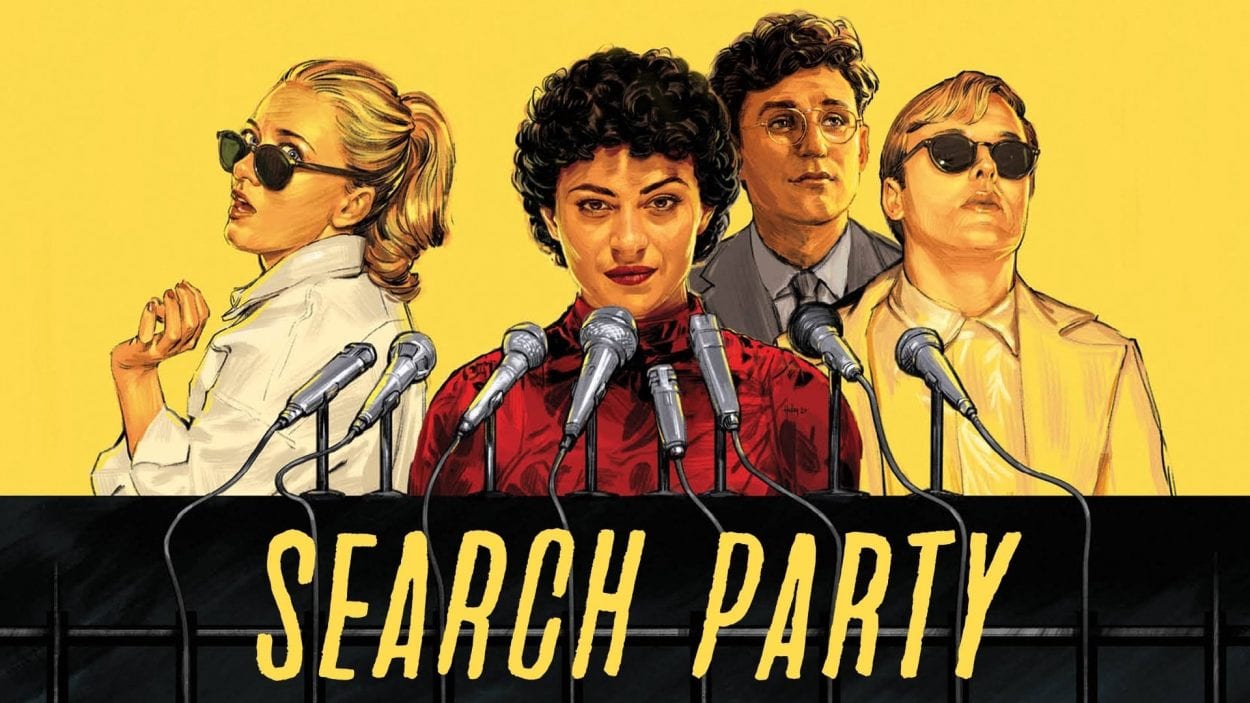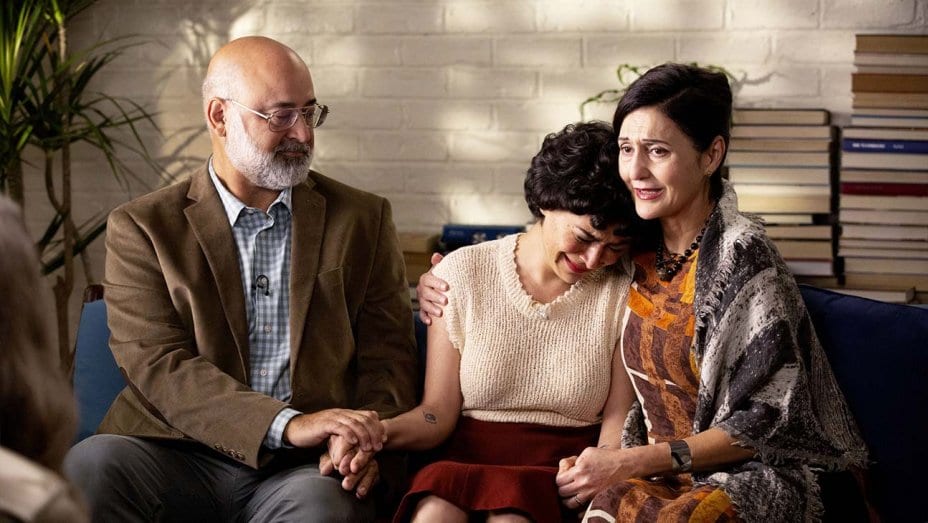The following contains spoilers from Episodes 1 through 5 of the third season of HBO Max’s Search Party.
There are few things I would wait almost three years for. Sure, it feels somewhat normal to wait that long for an album, but a television show? Absolutely not. And then of course with an extended wait time comes heightened expectations. And the worry that the show that once felt relevant will feel disconnected from current times.
Well, cast your worry aside and keep those expectations high because Search Party’s bitingly satirical third season continues to deliver the goods setup in the first two seasons. (Or at least the half of Season 3 that I’ve currently watched delivered the goods.)
But First…A Brief Look Back
Search Party starts off as Dory Sief (Alia Shawkat) finds out that college acquaintance Chantal (Clare McNulty) has gone missing. Looking for a deeper purpose in her life, Dory becomes engrossed in finding Chantal and drags boyfriend Drew (John Reynolds), and friends Elliott (John Early) and Portia (Meredith Hagner) into the mystery as well. Somewhere in the process, Dory becomes overly involved with private investigator Keith (Ron Livingston) who follows her to Montréal in the search for Chantal, which involves a $250,000 reward that Keith cares about but Dory doesn’t even know about. Dory and friends (not to be confused with Dora and Friends) find Chantal (who faked her own disappearance). And then in the last ten, jam-packed minutes of the first season: Keith confronts Dory after following her, Dory tases him, Keith hits his head on the marble counter, recovers, and then jumps on top of Dory, and then Drew rushes in and bludgeons Keith over the head with an obelisk-shaped interior design award…thereby killing Keith. Keith’s corpse is quickly shoved into a closet with the help of Elliott. Portia gets home just in time to avoid the drama and Dory needs to excuse herself to go throw up in a sink. But hey, it was self-defence, right Dory?
Enter Season 2 and we’re right back where we were. Keith’s body is thrown in a pink, zebra print suitcase (it was on sale!) and then buried in a shallow hole. Portia insists on knowing what everyone is hiding and then is mad when they tell her the truth. Dory puts Keith’s phone on a train ride across Canada and then everyone heads back to New York (with Chantal) and pretends that things are normal (well, normal according to the story they made up). Tensions rise, everyone’s stress comes out in different ways, the cops start sniffing around when Keith’s body is found, and nosy neighbour April (Phoebe Tyers) starts listening in on Dory and Drew when they fight about Keith’s murder. April eventually blackmails Dory and Drew for $100,000 after leaving mysterious threats and when Dory’s quid pro quo cash alternative proves less than pleasing to April: Dory pushes her off the Staten Island Ferry…thereby killing April. Dory then goes to her work party and gets publicly arrested for the murder of…Keith…not April. Dory looks at herself in the shattered rearview mirror of the police car. Ooh, symbolism! Not self-defence this time, was it Dory?
But Wait…What About the Title Card?
Each season’s title card is a different color, so let’s engage with that for a moment. Season 1 was blue. The obvious takeaway would be sadness, but let’s stretch that a little bit and think about Millennial yearning, which is arguably the greatest emotion in Season 1 (at least for Dory). Millennials just want to matter…or do something that matters! Beyond yearning/sadness, blue can also signify stability (something Drew, Portia, and even Elliott seemingly have in the first season—at least career-wise), or aloofness (something Millennials are often accused of) which they all have in excess.
Fast forward to Season 2 and the title card fades from blue to red. It’s literally getting darker. It’s a Hitchcock-steeped season, amongst other things, but really this choice of red can be best summed up in its most obvious emotional counterpart: anger. Slow-boiling Millennial anger at that. (It’s worth noting that Dory only pushes April over the railing after April’s threat-laden monologue about Millennial entitlement and self-involvement.) Strangely enough, Season 2 also finds its protagonists in big, red love. Drew and Dory have a brief, passionate moment of reconciliation. Elliott proposes to Marc. Portia’s director “makes love” to her. Yes, the season is more about anger and trauma—it’s not a think piece about what millennials want from relationships—but it does tread into that territory at times.
So what does Season 3’s now yellow title card foreshadow? Well, if Season 1 dissected Millennial yearning and Season 2 dove into Millennial anger…will yellow deal with Millennial happiness? Hah, no. From what I’ve seen of the season so far (and I needed to dig into the color psychology of yellow to make this connection) yellow may be being used to indicate the theme of the Millennial Attention Span and what holds it. Yellow is a color often used to quickly get attention…but it can quickly be abrasive when overused. So where will that lead us?

“So You Want to Know The Truth? Well, This is The Truth”
We’re dropped into the third season with a shaved-head Dory looking directly into the camera and saying the above line. It’s jarring and quick, but hey the Millennial attention span is twelve seconds, and just like that we’re back in the cop car with curly-haired Dory with two officers who are talking dick size. I know we’ll go back to shaved-head/future(?) Dory at some point this season, but she’s absent from the rest of the first half.
Instead, the first half of the season focuses primarily on the criminal justice system and the fascination with the True Crime genre in pop culture. For a season filmed and written almost two years ago, it feels surprisingly relevant. Right down to a contagious virus joke and Portia and Elliott speeding away to The Hamptons when things get bad.
“I know a place far away from all of this!”
“Our imaginations?”
“The Hamptons!”
– Elliott & Portia (S3E2)
It also feels timely for Dory to take a stance that truth is up for debate. As she boldly proclaims “I’m not a murderer” in her mugshot session (which goes viral) you can see the wheels turning in her head. It’s a terrifying moment that would’ve felt unheard of after watching the first episode of this show, but the fact that it feels like a natural progression is a testament to both the writers and also the acting of Shawkat.
“America Has the Best Justice System in The World”
Enter our supporting “justice” ensemble for this season: Michaela Watkins, Shalita Grant, and Louie Anderson. All are terrible-in-their-own-way lawyers, and yet each might be there to explore something different about the justice system. Watkins’ US Attorney is overworked, dry, and yet so laden in the bureaucracy that actual justice seems to get away very quickly (see mainly: the internal investigation into Joy who pins Keith’s murder on Fat Frankie when she shoots him by accident). Grant’s Cassidy Diamond is defending Dory. In her first case as a lawyer. On paper, this seems like the type of public defender karma would deal Dory. But it’s Cassidy parents who actually paid Dory’s bail in exchange for giving their daughter Dory’s now high-profile case. And Anderson so far is Drew’s in-the-game-for-too-long defence lawyer with a good reputation but no energy (see: falling asleep on the couch).
The first five episodes build us into Dory and Drew getting out on bail, forming their respective defences, and reshaping their public narratives. Cassidy wanted to go with self-defence, as did Drew (and Elliott and Portia) but Dory’s choice to say that they were completely uninvolved to the press ends up making life hard pre-trial, so I can’t imagine what’s coming down the line for them. That being said, maybe if Dory gets enough public support on her side and plays the narrative just right they will get off completely innocent.

“Women Get Scrutinized, Men Get Pastas”
By the fifth episode, Dory is doing exactly that. She’s doing an exclusive interview on The American Hour (hosted by Kidding’s Annette O’Toole) with her parents. It’s a tense episode as old squabbles come to the surface within Dory’s family (Dory has a distant relationship with her parents) while she emotionally manipulates them to do the show. Meanwhile Drew has a fangirl deliver him baked pasta shells, Elliott plans his wedding, and Portia joins a church bake sale. So what does this exactly mean for the rest of the season? Well, Dory perfects the image of the broken and sensitive girl for the camera. She cries on her mom’s shoulder after a monologue that ends in “…and now I’m trying to figure out how to fight for my life!” Drew is dressing like a boy from Connecticut and eating pasta. Elliott is taking money for his wedding from corporate sponsors who want to gay-up their image. And Portia is maybe becoming a born again Christian (because everyone turned against her since she’s the reason the secret got out).
In each of their own ways, they are fulfilling a certain trope, and I think they’re all doing it because society is so closely monitoring them now that their case has brought them fame. They’re all a lot more complex than this, and their desires aren’t really fleshed out here, and I think that’s maybe the most interesting thought from the first half related to my “Millennial Attention Span” spiel. That due to this over-saturation of content, public figures are forced into a box because there is no room for nuance or contradiction in their personality or personal lives. That, and well the fact that people are gullible and will believe what they are shown in the media. By no means is this like a rosy analysis of culture and media. Nothing good is being said about the Millennial Attention Span and what gets its attention. But I do think that what they’re hinting at here is interesting, specifically through the lens of the justice system and true crime genre.
So…What Now?
Honestly, I know a lot will happen in the last five episodes and particularly the finale. At this point, I have more questions than answers about where this will go because there’s so much yet to be seen. There’s a mysterious fanboy getting a knuckle tattoo of Dory’s name whom we haven’t seen the face of yet, there’s Elliott and Marc’s wedding, and Chantal’s business venture. Then there are little skeletons in the closet that I think could come back to haunt them: the murder weapon Drew buried and Elliott’s van still in the Hamptons. Of course, we also have the whole court case for murder to get through.
I’m really glad this show didn’t take the Big Little Lies route and become a court drama after its hiatus. I know it still could but the fact that we haven’t entered the courtroom yet is a good sign. And by delaying going there, it makes the inevitable setting that much more foreboding. What will happen to Dory in court? Dory’s lawyer said she could do one of three things: take a plea deal, argue self-defence, or plead insanity. And we know two of those are off the table. And we know Dory shaves her head at some point…so like what’s your guess?

